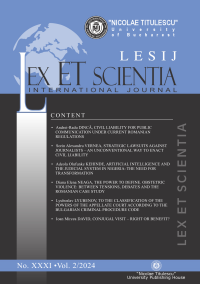FICTITIOUS INVOICING IN THE VAT SYSTEM
FICTITIOUS INVOICING IN THE VAT SYSTEM
Author(s): Zoltán VargaSubject(s): Politics / Political Sciences, Politics, Law, Constitution, Jurisprudence, Fiscal Politics / Budgeting, EU-Legislation, Commercial Law
Published by: Universitatea Nicolae Titulescu
Keywords: VAT; fictitious invoice; National Tax and Customs ;
Summary/Abstract: We often hear in news reports that employees of the Hungarian National Tax and Customs Administration seized luxury cars and real estate on suspicion of large-scale VAT fraud and then auctioned them off. These cases are the tip of the iceberg, but according to various European Union surveys, abuses about VAT refunds in the EU cost Member States EUR 140 billion. In the case of Hungary, this results in a loss of nearly HUF 400 billion in the budget. One of these forms of abuse is closely related to the use of fictitious invoices. For decades, the tax authority has been seriously trying to track down businesses that issue and receive fictitious invoices. In my study, I examine the abuse of fictitious invoices, with special regard to tax evasion committed by issuing and receiving fictitious invoices. I will also mention the consciousness of taxpayers in this regard, as this has a significant impact on the determination of sanctions according to the court's case law. Given that transactions cross national borders, I will also refer to the case law of the Court of Justice of the European Union. I also analyze the importance of digitalization by the tax authority, which plays an increasingly important role in detecting transactions.
Journal: LESIJ - Lex ET Scientia International Journal
- Issue Year: XXXI/2024
- Issue No: 2
- Page Range: 63-76
- Page Count: 14
- Language: English

